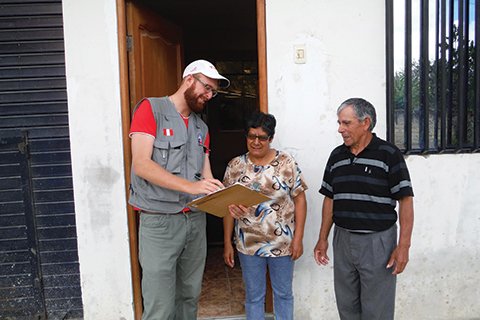Brad Weiss: Adventurous engineer

Even though they graduated four years apart and didn’t know each other at school, Teigan Gulliver’s experience led Brad Weiss (CivE ’12) to the Peace Corps in Peru.
As a fellow University of Minnesota civil engineering graduate, the similarity of their experience wasn’t entirely a coincidence. Weiss learned of the Peace Corps through Gulliver’s father, John Gulliver, a professor of civil, environmental, and geo- engineering in the College of Science and Engineering.
“A lot of people with a civil engineering degree go into standard consulting...Some of these opportunities to work and travel the world in a non-traditional way can be prettygreat.”
--Brad Weiss
As he neared graduation, none of Weiss’ initial job offers were very appealing. So he enrolled in graduate school (environmental engineering at Michigan Technological University) and a program called Peace Corps Master’s International, which pairs graduate studies with the opportunity to serve abroad and develop an international academic project.
Like Gulliver, Weiss is serving a two-year hitch in Peru. Since November he’s been living in Pomacochas in the foothills between the Amazon and the mountainous spine of the country. His room overlooks Laguna Pomachochas. “I love it here,” Weiss said.
So far he has taught a summer school program on world geography that stressed environmental awareness to children ages 3 to 16. He also taught a computer class to fifth- and sixth-graders. He tried teaching basic programs such as Microsoft Word and Excel, but admits the kids had other priorities. “Just about every kid wanted a Facebook page,” he said.
As he gets deeper into his service, Weiss has been organizing river clean-up days. A grant from the Minnesota Returned Peace Corps Volunteers paid for a weather station to teach about weather and climate change, as well as a video to create a public service announcement for local television. He has also been talking to officials about improvements in the water system to fix leaks and deliver potable water.
The best part of his experience, Weiss said, is that “every day is an adventure. You could be walking through the mountains conducting a water system inspection one day. The next day you could be in a formal meeting with the mayor and government officials. The day after that, you could fall into a swamp. All these things have happened to me.”
“A lot of people with a civil engineering degree go into standard consulting, working for an engineering company or a private firm. But some of these opportunities to work and travel the world in a nontraditional way can be pretty great,” he said. “I’m having the time of my life down here.”
